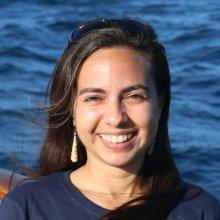
Laura Almod var Acevedo
Tell us about your work / research. What kinds of things do you do?
I work with black sea bass, a delicious and intriguing fish. It spends most of its life out in the ocean, but when young, it can use estuaries as a nursery habitat. I want to know what areas in the Chesapeake Bay estuary are available for black sea bass. To do this, I used a combination of modeling and field sampling. We built a model that, based on temperature, salinity and bottom type, can establish places that might be good for them. We also set fishing traps in the areas where the model says is good habitat to determine if the fish are using them. Knowing the factors that affect fish and their distribution gives us a better understanding of the fishery and helps make better decisions on how to manage it.
What sparked your initial interest in your career?
I grew up in Puerto Rico, surrounded by the ocean. I was exposed very young to Marine Sciences. I remember going with my mom to different spots through the island to collect samples for her Ph.D. work on marine fungi. This instilled in me an admiration of the ocean, but more than that, a curiosity to understand the different processes and organisms that occur in it. Since then I have worked hard to learn more about marine and aquatic sciences. I conducted undergraduate research in a variety of topics, like identification of benthic organisms and nutrient impact on mangroves. When it was time to decide what I would do with my bachelor’s degree in biology, I decided to continue my studies and pursue a Ph.D. in Marine Ecology.
Who influenced you or encouraged you the most?
My parents have always been my biggest encouragers. They gave me an example of perseverance and showed me the value of a good education. Besides, they are both scientists and some of their love for knowing more about the world around them definitely rubbed off on me.
What element of your work / study do you think is the most fascinating?
Black sea bass, the fish that I study, can change sex. Most are born as females and some can change to males later in their life (they are protogynous). Although my work does not focus specifically on this transition, I think it is a fascinating fact. I even saw one of my experimental fish change sex! I also like doing field work, especially when I get to drive the boat.
What other jobs led you to your current career?
I decided to study Biology in college because I felt I would get to learn more about many interesting topics (and I was right!). I especially liked when courses would have a field aspect to them, and when we could see and use in the outside world things we learned in the classroom. I had several opportunities to conduct undergraduate research in areas related to marine and aquatic resources, which I really enjoyed, so I kept looking into opportunities in this field.
What are your degrees and certifications?
Bachelor of Science in Biology – University of Puerto Rico Mayagüez Campus 2010; Ph.D. Student – University of Maryland Eastern Shore; Advanced Open Water Diving
What are your hobbies?
I enjoy reading, playing guitar and watching movies and television series.
What advice would you give to someone who wants to have a career like yours?
I think that to be successful in any career you have to have a mix of preparation and ambition. You have to acquire a variety of skills while also explore and try out for different opportunities. Do not be afraid to take chances and every now and then and remember that you can learn valuable competencies in different jobs and activities, not only in school. Try to share your research and the science that interests you with different people in your community. You will learn better communication skills while also educating and maybe even gain a new perspective.
How did you get involved with the Nautilus Exploration Program? How did you get on the ship?
I heard about the Nautilus Program in graduate school and took a bigger interest when they visited Puerto Rico in 2014. I followed the live streaming videos and found them fascinating. When I learned that there was an opportunity for students of the NOAA Educational Partnership Program to participate, I decided to apply because it would be an extraordinary experience as a student an as a scientist.
Expeditions
Laura participated in the following Ocean Exploration Trust expeditions:
